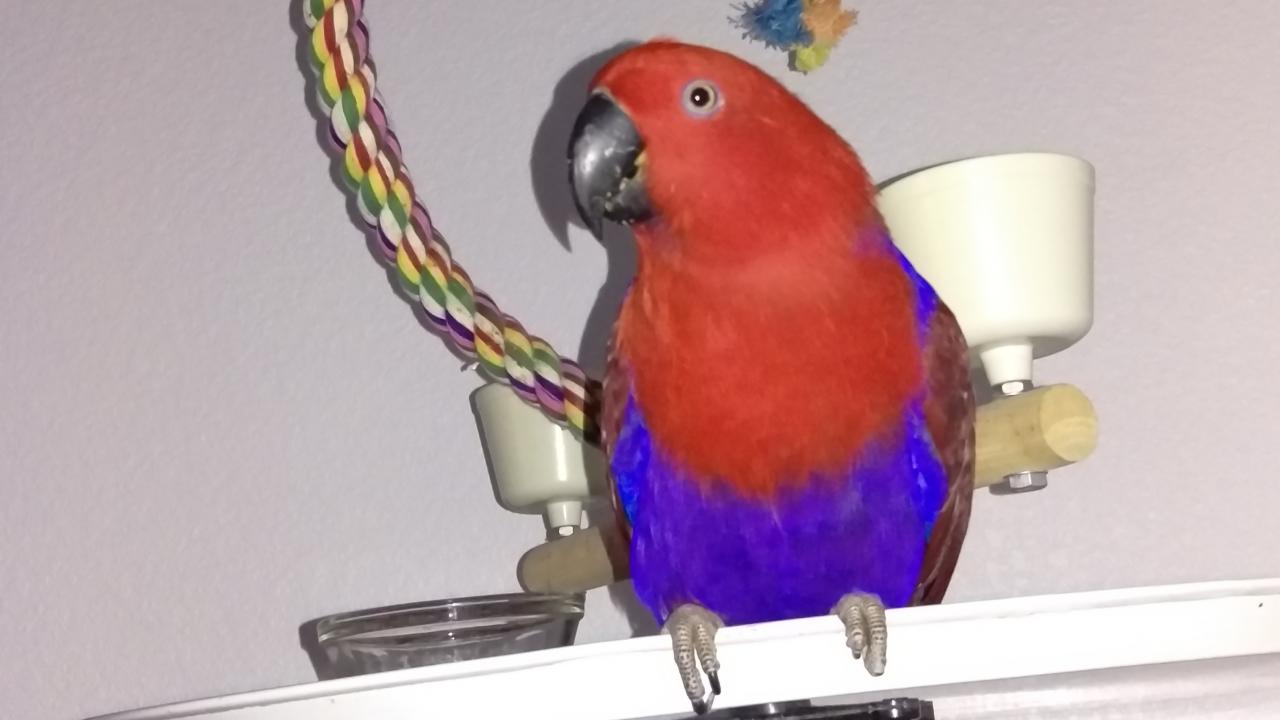
Parrot’s Challenging Fungal Infection Successfully Treated
“Case of the Month” – May 2019
Ginger, an 8-year-old female eclectus parrot, was not feeling like herself a few months ago. Over the course of several days, her decreased appetite caused her to skip a meal of kiwi—her favorite fruit—and she no longer danced around her cage like normal. Her owners thought she was having trouble with egg binding, a condition she suffered from previously. As regular clients of the Companion Exotic Animal Medicine and Surgery Service at the UC Davis veterinary hospital, they brought Ginger in for an examination.
Ginger was evaluated with a full range of tests. Radiographs showed no evidence of an egg in her, however they did reveal a proventricular dilation – an enlarged proventriculus, which is a glandular region of a bird’s stomach. An ultrasound showed free fluid in her abdomen. That fluid was collected and laboratory testing of it revealed a bacterial infection in Ginger’s abdomen.
Because a gastric outflow obstruction—a blockage—was suspected, a CT scan was performed but could not definitively rule it out. Drs. David Guzman and Kyra Berg performed a gastroscopy to evaluate the causes of these findings and found a severe yeast infection in her stomach, which was later confirmed with a fungal culture. This would cause her to not eat and to be lethargic.
This unusual condition in a bird presented a challenging case for the service. Thankfully, UC Davis had the right equipment and laboratory services on-site to properly diagnose her condition. A combination of advanced imaging, endoscopy and laboratory culturing allowed the exotics team to identify the exact fungus (Candida glabrata) that was infecting Ginger’s stomach, and they were able to prescribe the precise antifungal medications to best fight the infection.
Ginger was hospitalized for two weeks and received subcutaneous fluids and tube feeding to keep her on a balanced nutritional plane, as well as ensure she did not lose weight, as she did not eat initially during her hospitalization. She also received antibiotics and anti-inflammatory medications to help with the infection in her gastrointestinal tract and abdomen.
Ginger still had to be on several antibiotics and antifungal medications after being able to return home. Her owners diligently kept up her medical routine and brought her back for several recheck appointments over the course of her recovery. Fungal and bacterial infections can be difficult to resolve completely on short courses of medications, so Ginger remained on her medications for a few months.
At a recent recheck five months after the initial incident, Ginger’s owners reported that her behavior at home was back to normal and radiographs showed a continual decrease in the size of her proventriculus, finally returning to a near normal range and now appearing to be normal size. Repeated cytology and fungal cultures remain negative. Her owners will continue to work with the Companion Exotic Animal Medicine and Surgery Service to monitor her condition going forward.
Eclectus parrots are indigenous to northeastern Australia and many surrounding islands of the Indian Ocean. On average, their lifespan is 30 years. They are one of the few parrot families that exhibit sexual dimorphism, meaning the male and female display different characteristics (mainly size and color) beyond just their sexual organs. In eclectus parrots, males are green while females, like Ginger, have a red and purple plumage. In the wild, their diet consists of mostly tropical plants, fruits, nuts, leaves and seeds.
# # #
